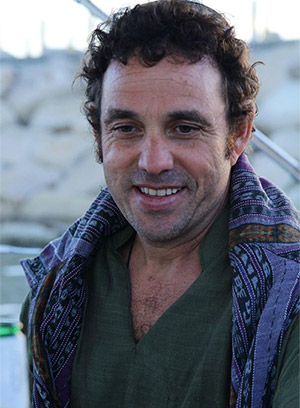
Etai Gilad
Where do you live?
Do you see clients from home or in a clinic?
How long have you been practicing?
I don’t know if I can call myself an Uncommon therapist but I surely live an uncommon lifestyle. Maybe it is good to present my story to demonstrate that it is possible to help people outside of the “normal” settings.
I started to practice at the end of 2008 in Amsterdam. For a year and a half I rented an office space in a community center nearby my house, getting clients through my website and word of mouth.
In 2011 I moved to Guatemala where I was running San Marcos Holistic Centre. San Marcos is a small village on the shore of Lake Atitlan (one of the most beautiful places in the world!), with a reputation as a healing place mostly in body work and alternative medicine. Most of the clients there are backpackers (of all ages), some stay for long periods and some are just passing by. Working there really shaped my therapy work. Most clients came for only one session (due to not enough money or time). Many times this was enough, but for some cases when I knew that I couldn’t help the person to “solve” the issue, I viewed the session as a pivotal point and my part was to help them open for possibilities, and stir them to the right path for them, trusting that whatever we did would be of some help in their way to healing.
As well I was giving a 3 day hypnosis course (hypnosis for everyday) – my version of UNK weekend course.
After almost 3 years I left San Marcos, my next job was at a yoga retreat in Troncones Mexico. Most of the clients are American and Canadian people who live the “fast life” and come for a week to rest and restore.
At the moment (April 2014) I’m visiting for short while the town of Auroville, an international community in India, where I offer sessions privately.
In all of these settings I found that when people travel they still take their issues with them, so the prospect of going back home “lighter” with positive change, was a great motivation.
What sort of practitioner are you?
Hypnotherapy / psychotherapy
Solution (possibility) – focused brief therapy.
Body work
Deep tissue massage
Thai yoga massage.
What problems/issues do you treat most frequently?
The range of issues varies greatly. Depression, anxiety, trauma, phobias, self confidence and decision making are common.
What are your biggest frustrations running your practice?
The difficulty of not getting a more regular stream of clients.
Not able to have a follow up session with most clients.
What do you find hardest about your daily work?
Do you find your professional body supportive and helpful?
Do they help you create connections with fellow therapists?
I am lucky to have good group of practitioners in most places I have worked. I find it helpful to be able to send clients to other specialists – acupuncturists, body workers and nutritionists can contribute a lot.
How do you balance work and life? Stress management/avoiding burnout…
I start my day early, taking my time for exercise (yoga or a walk in nature).
I make sure to have a good breakfast, and snacks that I can have between sessions.
Spend time with my wife and friends.
Learning and enriching my knowledge and skills.
What motivated you to become a therapist in the first place?
I probably have been attracted to therapy for many years. I always liked to talk to people (the listening I needed to learn!) and many times friends told me that “something I said the other day really struck a chord”.
I was involved in some new age therapy (breath work) and became fascinated by why some people made real change in their life while others just kept on coming for more sessions and workshops but didn’t seem to change at all? I began to look at ways to help people to create positive measurable changes in their lives.
About 9 years ago I was facing a low phase in my life – the end of relationship, a job that didn’t satisfy me anymore, and too much time on my hands. While looking for something to help myself I found Hypnosis Downloads. I downloaded my first mp3 and listened to it. To my surprise I got up 20 minutes later feeling different. I then kept on reading and downloading more hypnosis mp3s. After a few months I joined U.N.K. hypnosis online course, and realized that this is what I want to do and the way I would like to contribute to the world. I then joined the Uncommon Knowledge diploma course.
What frustrates you most about the way mental health is dealt with in your country?
Overall the views about hypnosis as an alternative medicine with a “new age” approach (past life regression etc..).
To the extreme of countries like Israel where it is against the law to do hypnosis if you don’t have a PhD.
Can you tell us about your most uplifting experience treating a recent client? (anonymously of course!)
I was working alongside a yoga teacher training group. I knew the teachers, and few of the participants were my friends as well. After the first day of the course a few of them approached me and said that “there is a client for you”. Apparently one of the ladies in the group took the 10 minutes introduction and made it an hour and a half monologue. In the next few days more group members approached me and even told me what kind of work I should do with her. After the group leader suggested to her to come and see me she signed up. When she booked the session she told me that in the past she used to manipulate her therapist so he would prescribe her drugs. I replied by saying that “since I can’t prescribed you any drugs, you can feel free to manipulate me or not as long as you feel that it will help you to get the most benefit from the session.”
She came from a strict religious family, as a child and in her teens she wanted to be an actress, but her mother didn’t allow her as it stood against their beliefs. In the age of 15 her parents decided that since she was not following the religious code she couldn’t stay at home. They then sent her to her aunt in a different city (against her will).
She then became a stripper, heroine (and other drugs) addict, and at times a callgirl. After she lost custody of her first daughter, she made a change in her life, “cleaned up” and now days she is married and has two kids.
It was obvious that she had a lot of therapy in the past, she could analyse every part of her life, coming with a theory of the reasons that everything happened. Any solution focused questions I asked got a long detailed story as reply. Since it was not her idea to come and see me it was hard to find a coherent goal to focus on. It started with “I have a few alter egos (with names)”, and I’m sure it was a lovely topic for hours of talk with past therapists, but I was not very impressed and with a few process questions and normalization she said that it’s not a problem really. Almost an hour passed and I didn’t know where this session was going? It looked like she handled what could be traumatic events very well and apart of the memory of her mother sending her away from home, she was more than happy to tell any of her life events in great detail with a very fast mode of speech.
What I could read behind the scenes was a need for attention and status.
I then stopped her in mid sentence, looked at the ocean view outside the room for a while as I was trying to understand something, and then I asked her in a slow voice, about the feeling of being on the stage as a stripper, when all the eyes were on her and she got full attention? I kept building the scene and could notice her going into trance. She then said that her drug intake was an attempt to recreate the feeling of being on the stage. I then invited her to close her eyes and get deeper into the feeling then anchor it, we explored more assets (getting off drugs, being a good mother) and explored the benefits of be able to access those feelings in different parts of her life.
She later remarked that it was the first time anyone referred to her being a stripper in its positive aspects, even though she had believed that all along. And the realization that she already had those feelings inside her and she didn’t need to go on the stripper stage to experience them made great impact.
In the next days the change was remarkable, both her teachers and her peers commented about how much more relaxed and cooperative with the group she was.
The next week she came for another session, this time of her own accord. She resolved that on return to her country she would use her new skills as yoga teacher and her life experience to help drug addicted people to rehabilitate. She wanted confidence in this new way. Her goals were much clearer and the session shorter and easier.
 The view from Etai’s current office!
The view from Etai’s current office!If you would like to be our next Practitioner in Focus, click here and let us know!






